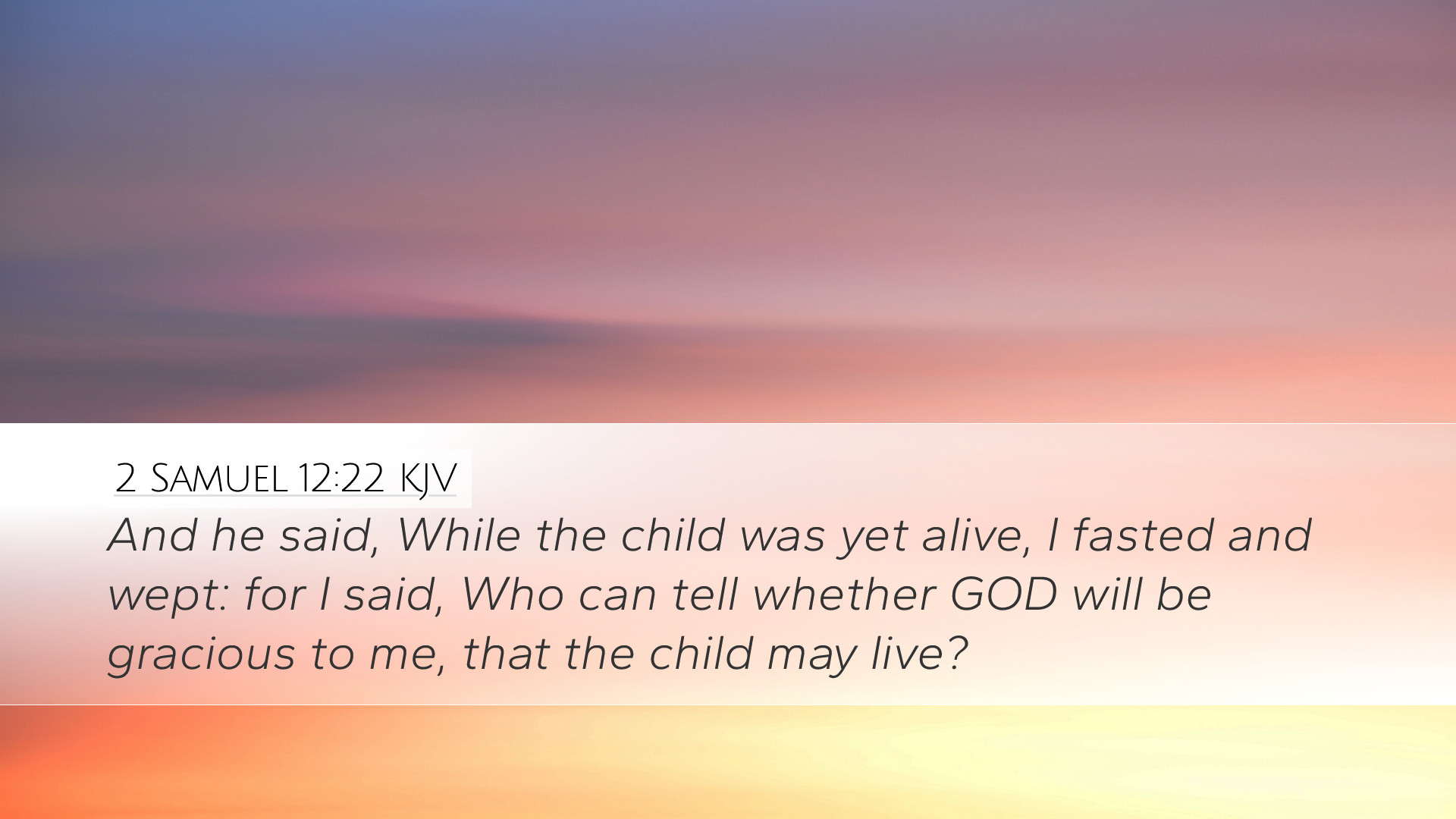Commentary on 2 Samuel 12:22
Verse Reference: 2 Samuel 12:22 - "But he said, 'While the child was alive, I fasted and wept; for I said, “Who knows whether the Lord will be gracious to me, that the child may live?”'
Context and Background
The tragic story surrounding this verse emerges from King David's history following his sin with Bathsheba. The birth of their child is a direct consequence of David's transgressions, including adultery and the arranged death of Bathsheba’s husband, Uriah.
After Nathan the prophet confronted David regarding his sin, God pronounced judgment upon David, signaling that the child born from this union would die (2 Samuel 12:14). This verse captures David's desperate plea for the child’s life.
Theological Insights
Matthew Henry elaborates on the significance of repentance and mourning in this context. He notes that David's fasting and weeping signifies a deep awareness and recognition of sin before God:
- David’s Sincere Repentance: His actions reflect a heartfelt desire for God's mercy, showcasing the importance of turning to God in times of crisis.
- Divine Sovereignty: Henry emphasizes that David’s awareness of God's sovereignty did not hinder his urgent prayer, which exemplifies faith's power in the face of despair.
David's Response to the Child's Illness
Albert Barnes notes that David's fasting was a significant act of humility, a form of spiritual warfare where he sought the Lord for mercy. David understood that the life of his child was in God's hands:
- Public vs. Private Mourning: David fasted publicly during the child’s illness, indicative of his love and desperation, but he refrained from mourning after the child’s death. This transformation illustrates a move from hope to acceptance of God's will.
- Understanding God’s Will: The period of fasting reveals David’s understanding that he could influence God’s decision through prayer, although he ultimately submitted to divine wisdom.
The Nature of Fasting and Mourning
Adam Clarke provides insight into the purpose of fasting, emphasizing that it is often misunderstood as a means to manipulate divine outcomes. Clarke argues that the act of fasting in this context signifies a genuine plea for God's mercy, rather than a mere ritual:
- Spiritual Intensity: Clarke suggests that David's actions represent the depth of his commitment to seeking God's intervention, highlighting the intensity of grief and the human desire for life.
- God's Justice: Clarke's discussion further implies that whilst David sought mercy, God’s justice must prevail. The mortality of the child serves a purpose within God's overarching plan, which may remain beyond human understanding.
Lessons for Today
This verse and its surrounding context offer profound lessons for contemporary believers:
- Comprehensive Repentance: Encourages sincere acknowledgement of sin, much like David, who sought forgiveness and grace. The importance of genuine contrition in prayer can inspire individuals in their own walk of faith.
- The Role of Intercession: David's fervent intercession poignantly illustrates the importance of praying for others. It empowers church leaders, students, and theologians to pursue prayer with vigor, trusting in God’s ultimate goodness.
- Acceptance of God’s Will: The ultimate acceptance of God’s decisions offers a model for faithfulness amidst suffering. Believers are invited to trust in God’s character, even when the circumstances appear grievous.
Conclusion
2 Samuel 12:22 sheds light on the human condition—the deep-rooted struggle with sin, longing for redemption, and seeking divine mercy. In combining insights from Matthew Henry, Albert Barnes, and Adam Clarke, it leads us to recognize that while grief is evident, faith and reliance on God's will must guide our response. The perseverance in seeking God, just as David did, exemplifies the heart of true faith and the longing for relationship with God, regardless of life's outcomes.


